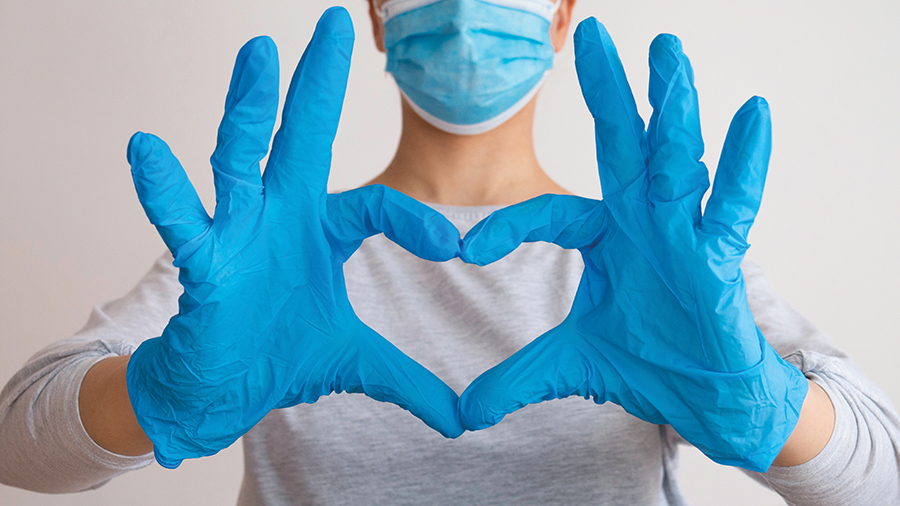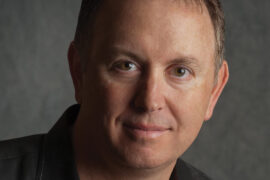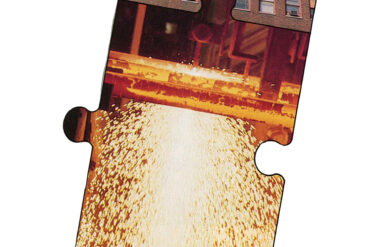From volunteers sewing masks at home to dedicated physicians to frontline health care workers, these are some of the heroes in the fight against COVID-19.
HQ 110 | SUMMER 2020
How a community responds to a crisis can define the character and resolve of its citizens. In the case of the Huntington region, there is much to be proud of in how it has coped with the COVID-19 pandemic. If you look at the number of those who have become sick or died from the novel virus, it is clear that the health care community has done an outstanding job. As this issue of the magazine goes to press, Cabell County has only had 341 confirmed cases of the virus and two deaths. Those are remarkable statistics in the face of a global pandemic.
So why has this region fared so well compared to the rest of the United States? The answer can be found in the following pages, in articles about hardworking volunteers, dedicated physicians, hospital administrators, community leaders and frontline health care workers.
One of the keys to Huntington’s successful response to this crisis is its ability to come together for the greater good of the community. This region has faced numerous challenges in the past and has always found a way to rise to the challenge. And that is something we can all take pride in.
Rising to the Challenge
Dr. Larry Dial and Dr. Kara Willenburg are considered heroes for working countless hours to combat the COVID-19 pandemic.
By Michael Friel

The COVID-19 pandemic has challenged even the most dedicated, knowledgeable and effective leaders. How does one lead during a time of unparalleled crisis, fighting a highly infectious — and potentially deadly — virus never before seen, about which little is known?
In the greater Huntington community, that enormously burdensome responsibility rests in the hands of Dr. Larry Dial, chief medical officer for Marshall Health, and Dr. Kara Willenburg, chief of infectious diseases at the Marshall University Joan C. Edwards School of Medicine. Colleagues say Dial and Willenburg have risen to that challenge, “providing steadfast guidance and leadership during an unprecedented time.”
“They have put in countless hours in our clinics, in the hospital and in administrative settings providing the most current science-based guidance on all our efforts,” said Dr. Joseph Shapiro, dean of the School of Medicine. “They have worked seamlessly with our Health Department colleagues to keep communication and coordination flowing to best serve our community.”
Armed with the latest information about the virus and their own knowledge and expertise, Dial and Willenburg have overseen development and deployment of safety procedures and protocols across the 40 clinics of the Marshall Health system.
They have collaborated with colleagues at Mountain Health Network to implement safety measures within Cabell-Huntington Hospital and St. Mary’s Medical Center, protecting the health of thousands of patients and medical professionals.
Meanwhile, the larger Marshall University community and the Cabell Huntington Health Department have leveraged their expertise to ensure COVID-related decisions by officials are buttressed by sound medical advice and the public remains well informed.
“The major focus has been to bring all of the team players and resources together to help define the problems and situations that we need to address at the moment, then put teams around solving those issues and implementing responses,” Dial said.
Willenburg said she has been impressed with how diverse groups have worked in tandem.
“These are entities that don’t normally collaborate on a daily basis; but when the need has arisen, we all have worked together toward common goals,” she said. “It’s been a great response from our health care workers in the community.”
By their own calculations, perhaps the physicians’ most important role has been the timely dissemination of accurate information, both to other medical professionals and to the general population.
“The public has had multiple questions about what is reality,” Dial explained. “They want to know ‘What do I need to do?’ and ‘What is my risk?’”
Dial and Willenburg dispensed advice during two town-hall teleconferences organized by U.S. Congresswoman Carol Miller that drew more than 10,500 West Virginians starved for information.
“People were really looking for guidance and information from a source that can be trusted,” Dial said. “That’s not political, that’s not trying to have another agenda, but just trying to improve the overall health.”
Willenburg said people must learn to live with the pandemic for the foreseeable future.
“We have to figure out those techniques to make our lives a little more normal,” she said. “We can learn to live safely in the world and have good quality to our lives with some adjustments. You still should wear a mask, still practice good hand hygiene, social distance and stay home when you’re sick.”
Throughout the pandemic, the tireless work of Dial and Willenburg has been punctuated with early morning phone calls and late-night consultations — this for two already busy physicians.
“Everything seems to happen at night,” Dial said. “All the positive tests seem to come back on Friday or Saturday evenings. It’s the unpredictable nature of the testing and other issues that really extend our hours.”
Dial and Willenburg are considered true medical heroes by many. But at the end of another long shift, another hectic day, they are humans — individuals with lives, families and concerns of their own, who nonetheless toil tirelessly for the greater good of their community.
A True Leader
As the Chief Medical Officer at both of Huntington’s hospitals, Dr. Hoyt Burdick prepared frontline workers to successfully treat the novel coronavirus.
By Jean Hardiman

It’s only right that the efforts of frontline workers are celebrated during a pandemic. They interface with frightened and suffering patients. They save lives.
Behind the scenes are those helping them do their jobs, including those who help lead and coordinate everyone’s efforts and communicate the latest information to all those who have a job to do.
Here in Huntington, Dr. Hoyt Burdick has helped play that role. As the Chief Clinical Officer for Mountain Health Network and the Chief Medical Officer for both Cabell Huntington Hospital and St. Mary’s Medical Center, Burdick has provided leadership to help coordinate dozens of moving pieces. Making sure the proper experts are empowered to successfully treat the novel coronavirus, overseeing the gathering of equipment, implementing guidelines for employees to stay safe
and facilitating changes in the airflow in hospital rooms to stop spread of the disease — these are just a handful of the infection control and safety efforts that Burdick helped to lead.
Change is common in health care, but helping to lead an operation of such magnitude — and at warp speed — was something that Burdick had never experienced in his career, including the onset of the AIDS epidemic in the 1980s. It’s been his job to ensure the hospitals had emergency preparedness plans in place. Boy, did they use them.
“We were as prepared as we could be with the nuances and the evolving CDC guidelines about how to control and manage this coronavirus,” said Burdick, who graduated from the University of Mississippi Medical School in 1980 and joined Cabell Huntington Hospital in 1987 as the medical director of respiratory care. “It’s nothing like words on a piece of paper when you actualize how to respond to a highly infectious agent. It required just a multitude of adaptations.”
He did not take his responsibilities lightly. For 50 days, Burdick arose at 4:30 a.m. to review the latest information on the virus and created PowerPoint presentations for medical staff, employees, board members, the Cabell-Huntington Health Department and other community players. They discussed the current numbers of cases, beds and ventilators and the status of the emergency room, operating room, intensive care unit and more.
There were dedicated units where airflow was correct and PPE (personal protective equipment) was in place. Employees changed their focus to not only tending to patients but also assessing their own health to protect each other and their families. Medical workers rose to the occasion with excellent care and treatment, as did the environmental service workers, who were pivotal, he said.
“It was reassuring to see everyone knew their role — seeing a plan work like clockwork on our very first case,” Burdick said. “All the technologies and expertise of our intensivists came together to save lives. We serve 28 counties, and we have had some patients we tried to save and were unsuccessful, and we have some who have survived. We have had heroic healthcare efforts to save lives that would have been lost.”
He was impressed at community members’ response as well, as many stayed home and adapted their business and family practices. Burdick was also grateful for the many ways that businesses, groups and individuals helped, from restaurants donating food to community members finding innovative ways to make and contribute PPE.
“Huntington comes together —whether they’re fighting the opioid crisis or a pandemic or whatever the issue,” he said. “It was appreciated that the community recognized the value of health.”
Burdick pointed out that everyone came together in the fight against the pandemic.
“It was both a response to patients with COVID and a question of how to care for patients with a stay-at-home order or closed offices,” said Burdick, who was in training as a lung specialist and an ICU physician when the HIV epidemic broke out.
This year, he’s watched as telemedicine became a lifeline and saw the role it will play in the future for needs that can be addressed that way. He also foresees a whole new world for upcoming resident physicians.
“The world they’re entering is nothing like it was for the doctors we welcomed a year ago,” he said. “It’s exciting. That’s why we go into medicine — to serve and apply science and hopefully make a difference.”
West Virginia Mask Army
Suzanne Strait, a Marshall University professor, is leading an army of volunteers across the state and making a difference in the lives of thousands.
By Kaylin R. Staten

During the initial influx of the COVID-19 pandemic, many people didn’t know where to turn to get needed supplies.
One woman, backed by an entire army, changed all of that in West Virginia. Dr. Suzanne Strait, a biology professor at Marshall University, started the West Virginia Mask Army in March after ruminating about the overwhelming needs for personal protective equipment (PPE).
“I started thinking about this at the end of March when things were starting to look grim,” Strait said. “There was a huge shortage of personal protective gear in the country. It just really upset me.
I spent one day thinking about all of my former students from anatomy classes who are first responders now. So, I got really depressed and thought about it, woke up the next morning and decided to do something. Within a day, I was contacted by people I know well and complete strangers about helping out after starting the Facebook page.”
When two former students, Patricia Rogers, CST-D, and Rose Ayoob, MD, contacted her, Strait worked with them and her daughter to form the first masks. Originally, the Mask Army created masks out of furnace filters for first responders as an N-95 alternative. The four women purchased supplies and then created unwoven masks for 24 hours straight to assess what worked and what didn’t.
With the help of that initial team of volunteers, the West Virginia Mask Army’s actions settled into a plan. Within the first 24 hours, the small group had its first breathable, furnace filter design, known as the Patricia Mask. By the 48-hour mark, they had recruited volunteers, found supplies and begun asking for funds to sustain the entire process. The team also applied for nonprofit status and received it within a week.
The Mask Army began in Huntington, but Strait always envisioned setting up non-contact hubs across the state to accommodate the growing PPE needs. The hubs allow volunteers to pick up supply kits, sew the masks and then drop off finished masks for distribution. The Mask Army communicates via its website and Facebook group, efficiently streamlining the process and maximizing its efforts.
The initiative has grown to more than 400 volunteers in eight hubs across West Virginia. To date, the Mask Army has created and distributed more than 43,000 masks in 38 of 50 counties.
As the needs grew across the state, the group’s volunteers began to craft multilayered, rewashable, cotton-based masks with filter pockets.
“Since we’re in this for the long haul, we needed to have a washable product, and the furnace filters were not designed for that,” Strait said. “You can’t really clean them, and ideally you don’t reuse them without cleaning them. As soon as you use masks, they should be disinfected.”
With the uncertainty of the 2020-2021 school year in Huntington and beyond, Strait said the team is readying its sewing and distribution forces for an additional purpose: providing masks for secondary school students to use in the classroom, on the bus and in other settings.
Overall, Strait said the response has been surreal and worth every stitch.
“The recipients of the masks have been relieved and thankful,” she said. “The volunteers have kept asking what they can do the entire time. These volunteers span demographics so much, from different ages, ethnicities, huge variations in political backgrounds. The result is that nobody cares about those differences. Everyone just wants to help each other. It has been so great to do something that hasn’t been politicized in any way. It is a huge coming-together in the community and has been incredibly inspiring.”
For those interested in joining the West Virginia Mask Army or donating items or funds, visit www.westvirginiamaskarmy.com or join the organization’s Facebook group.
Ready & Able
Led by Dr. Michael Kilkenny and Dr. Kevin Yingling, the Cabell-Huntington Health Department was well prepared to face a new pandemic.
By Molly McClennen

Years before anyone had heard of COVID-19, the Cabell-Huntington Health Department was preparing to keep the community safe from it. Because its staff had participated in training on pandemic response well in advance of COVID-19’s arrival, the Health Department was ready to provide quick action and trustworthy information when the crisis hit.
“Nothing can really prepare you for a pandemic, especially a disease that is completely unknown like COVID-19, but the work we did to prepare us for any pandemic laid the groundwork for our response,” said Dr. Michael Kilkenny, physician director for the Cabell-Huntington Health Department.
Huntington Mayor Steve Williams said the expertise of Dr. Kilkenny and Dr. Kevin Yingling, chair of the board for the Cabell-Huntington Health Department, was invaluable to community leaders making hard decisions about how to respond to the virus.
“The guidance we received from Dr. Kilkenny and Dr. Yingling was the foundation of everything that is happening in the city to combat the virus,” said Williams. “I did not make any decisions without consulting them first. Dr. Kilkenny and Dr. Yingling are truly interested in evidence-based solutions based on science and reason. I trust them completely and will follow their advice on anything that relates to health care. If I am going to live through a pandemic, I want to be living in Huntington because of leaders like them.”
The foundation of trust the Health Department had established long prior to the pandemic made residents of the county more likely to follow its guidance.
“The Cabell-Huntington Health Department has proven itself to be trustworthy in addressing other health challenges in our community, such as Hepatitis A and addiction. Proving itself to be a trusted partner in addressing these other challenges allowed it to be in a position to be recognized as an authority in addressing this unprecedented challenge,” said Yingling.
Among the roles the Health Department played during the early stages of the pandemic was serving as a source of reliable information in response to questions businesses and individuals had about how the virus might affect them. In response to this need, the Health Department established a hotline staffed by its employees, who can answer those questions and refer callers to appropriate care and resources.
Health Department personnel have been instrumental in implementing testing in the county. A testing strike team is ready to quickly be on site anywhere people might have been exposed to COVID-19. The Health Department supports the National Guard in large-scale testing events, at one point administering 650 tests in two days. Through working with community partners to implement testing, Kilkenny said he believes a greater percentage of Cabell County’s population has been tested than in any other county in West Virginia.
The Health Department also oversees contact tracing for the county, interviewing each person who contracts COVID-19 and their close contacts. In June, Health Department staff talked with 600 people for the county’s 70 confirmed cases.
“We talk with people who are sick or who are frightened because they have been exposed,” said Kilkenny. “We have to have empathetic conversations and make sure they get good information about how to prevent the spread and protect their loved ones and get good medical care if they do get sick.”
Kilkenny gives credit to the people of Cabell County for their cooperation in response to COVID-19, as well as their response to other problems affecting the health of the community.
“Our community supports us, so we feel lucky to be able to serve them during this time,” said Kilkenny. “People in Huntington really do work together to attack challenges. I have seen that in immunization campaigns, with combating HIV and now with COVID-19. Anything that needs to happen, the partners come together to make it happen. That does not happen everywhere. Huntington is a special place, and that cooperation makes our city better.”
A League of Their Own
The coronavirus pandemic may have forced the Junior League to cancel an annual fundraiser, but the group still found a way to make a difference.
By Phil Alexander

In January, the Junior League of Huntington was planning their annual fundraiser for families and children known as Hard Hats and Heroes. The event allows kids to hop up into the driver’s seat of a fire engine, police patrol car, 18-wheeler and more where they can grab the steering wheel and blow the siren or horn. However, when the coronavirus pandemic hit, the organization was forced to cancel the event. Undeterred, the Junior League decided to do something proactive for the Huntington community.
“We already had sponsors lined up for our event, so we went to them and asked if they would like to redirect the funds to help those affected by the pandemic,” said Christy Houvouras, president of the Junior League of Huntington. “Ninety percent of our sponsors said ‘yes,’ and I think that says a lot about the heart of the Huntington community.”
Immediately, the group set about redirecting the funds to worthy projects in the region. The first place they contacted was the Facing Hunger Foodbank which was in desperate need of baby formula, diapers and other supplies; those items were flying off the shelves in local stores and were very hard to come by. The Junior League used some of their connections to contact the military, which shipped them 105 pounds of formula.
Next on their list was finding a way to help the elderly population in the region. Working with the Cabell County Community Services Organization (CCCSO), they purchased 200 packages of shelf-stable food items for at-risk senior citizens.
They then set out to lend a helping hand to the Ronald McDonald House Charities of Huntington. They donated $1,500 to assist the “home-away-from-home” for families who travel many miles outside of their own community to seek medical treatment for a child. The funds were used to purchase meals, cleaning supplies and personal protective equipment (PPE).
After receiving grants from the United Way of the River Cities and Mountain Health Network, Junior League members began making masks. Their hard work resulted in 1,500 face masks that were distributed throughout the region.
Finally, the Junior League members raised enough money to help low-income families across the state of West Virginia. Through the outreach of the Gabriel Project at St. Johns Episcopal Church in Huntington, they helped fund the purchase of 3,000 diapers, 2,500 wipes and $2,000 in cleaning supplies for the Mountain State’s hardest-hit regions.
“I am so thankful to our sponsors for allowing us to redirect their funds to make an impact in the fight against this pandemic,” said Houvouras. “And I am especially proud of our members who worked tirelessly in the last six months — whether it was sewing hundreds of masks, coordinating with other charities or calling in favors, they stepped up when it was most needed to make a difference in the lives of others.”
Dynamic Duo
School teacher Abby Weasenforth and her grandmother Irene Goff turn an old stash of fabric into much-needed safeguards against the pandemic.
By Carter Seaton

The old saying “one man’s trash is another man’s treasure” has never been truer than during the current coronavirus pandemic. While Abby Weasenforth and her 83-year-old grandmother, Irene Goff, wouldn’t consider their “stash” of fabric as trash, they certainly did turn it into a treasured object for lots of people.
After word of the global pandemic hit, Abby woke up on March 21 to learn that the CDC had approved cloth masks as a help in flattening the spread of the virus. She went directly to her grandma’s house and said, “This is what we need to do: We know how to sew, so we are going to make masks.” Without hesitation, her grandma, who had taught Abby to quilt, agreed. A special education teacher at Huntington East Middle School, Abby was on spring break anyway, so she and her grandma made masks all week. After 300 masks, she thought the demand would abate, but it didn’t.
Goff had taught her granddaughter to quilt when she was 8 years old, and the two have been close ever since. This project brought them even closer.
“My whole thing was to protect my grandmother,” Abby said. “I didn’t want her to get this virus, so we decided all the masks we made would be free.”
Word-of-mouth spread the news; and without any advertising or social media mentions, requests for masks poured in — and are still arriving. The duo has sent masks all over the United States and to Germany, the U.S. Virgin Islands and many local organizations.
Looking back, Abby shakes her head: “Never in my wildest dreams did I think our fabric stash would be used to create masks for a global pandemic,” she said.





